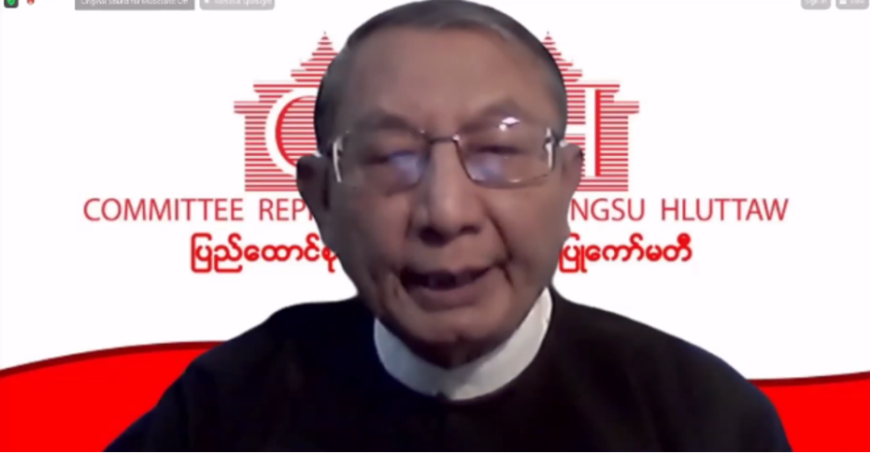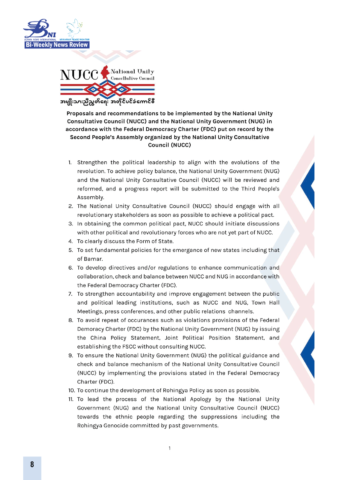
Introduction
In Issue No. 141 of the Burma News International (BNI)-Myanmar Peace Monitor’s Bi-Weekly News Review, we analyzed how the National Unity Consultative Council (NUCC) has so far failed to satisfactorily fulfill its establishment objectives, powers, and responsibilities. In the previous issue, Myanmar Peace Monitor raised questions about the accountability of NUCC member organizations towards the people and urged the Second People’s Assembly to make efforts to pave the way for the success of the NUCC’s objectives and activities in ending the authoritarian military system and building a federal democratic union.
This review examines the NUCC’s role, highlighting its weaknesses, challenges, and areas needing reform, based on the ‘recorded proposals and recommendations’ that the consultative council has failed to use effectively to deliver reports or pass decisions for the people after the Second People’s Assembly.
The report to the people
The Second People’s Assembly was convened by the NUCC for five days from 4 to 9 April 2024. A total of 204 delegates participated, representing elected parliamentarians, including the Committee Representing Pyidaungsu Hluttaw (CRPH), political parties, Spring Revolution forces, Ethnic Revolutionary Organizations (EROs), and interim state/federal unit councils. In addition, 104 special invitees and 128 observers attended the assembly.
During the Second People’s Assembly, participants and special invitees reviewed and offered recommendations on reports submitted by the National Unity Consultative Council (NUCC), Joint Coordination Committees (JCCs), and ministries of the National Unity Government (NUG). Based on the recommendations and feedback from the representatives, the assembly passed three decisions on issues related to local governance, rule of law, the military council’s conscription law, and Myanmar Citizenship Law (1982), which were announced by the NUCC on 9 April. 1
The three decisions include: (a) to review and establish harmonize mechanisms among revolutionary forces, including the National Unity Government (NUG), to assure the responsibility and accountability of ground administration, defense, and security mechanisms (People’s Administration Team, known locally as PaAhPha; People’s Defense Teams, known locally as PaKaPha, and People’s Security Teams, known locally as PaLaPha) in accordance with the Federal Democracy Charter, (b) combat the illegal conscription law of terrorist military and its consequences by an effective strategic response through collaboration with people and revolutionary forces, and (c) the Second People’s Assembly determined that the Myanmar Citizenship Law (1982) would be abolished. It shall be implemented in accordance with Chapter (5) “Interim Legislature” provisions of the Federal Democracy Charter.
In addition, the Second People’s Assembly decided to put the remaining proposals on record for further discussion by the respective political steering groups in accordance with the Federal Democracy Charter and agreed to hold the People’s Assembly every six months, as stated in the “Second People’s Assembly Report to the People.”
Recorded proposals and recommendations
The NUCC’s announcement on 9 April titled “Recorded proposals and recommendations to be implemented in accordance with the Federal Democratic Charter” by the NUCC and NUG included a total of 21 proposals and recommendations. 2
The following proposals and recommendations are listed in order from 1 to 5: To strengthen the political leadership to align with the evolutions of the revolution; to achieve policy balance, the NUG and NUCC will be reviewed and reformed, and a progress report will be submitted to the Third People’s Assembly; the NUCC should engage with all revolutionary stakeholders as soon as possible to achieve a political pact; the NUCC should initiate discussions with other political and revolutionary forces who are not yet part of NUCC to obtain the common political pact; to clearly discuss the Form of State; and to set fundamental policies for the emergence of new states including that of Bamar.
Also, “To avoid repeat of occurrences such as violations provisions of the Federal Democracy Charter (FDC) by the National Unity Government (NUG) by issuing the China Policy Statement, Joint Political Position Statement, and establishing the FSCC without consultation with the NUCC” was notably observed. It was also proposed that the NUG strictly follow the political guidance and checks and balances mechanism of the NUCC by implementing the provisions stated in the Federal Democracy Charter. (The original text of the recorded proposals and recommendations is presented at the end of this review.)
Findings from news reports
The Second People’s Assembly of the NUCC, initially planned for three days from 4 to 6 April, was extended to include 7 and 9 April due to insufficient time. However, representatives from the CRPH and NUG were reportedly absent from the final day of the assembly on 9 April. This absence has led to questions regarding the responsibility and accountability of the CRPH and NUG for the ‘report to the people’ that was published after the Second People’s Assembly.

In the notification letter that the CRPH sent to the People’s Assembly Organizing Committee, they cited five reasons for their non-attendance:
“(a) attempts were made to hold discussions and pass decisions that went beyond the provisions of the Federal Democratic Charter Part II; (b) attempts were made to hold discussions and pass decisions that went beyond the pre-distributed agenda for the Assembly (c) attempts were made to re-discuss and review a matter that the Chair had already decided to be put on record of the assembly in a subsequent agenda; (d) additional proposals submitted that were not originally part of the agenda require more in-depth discussion and consultation within the respective groups, as well as broader engagement with more relevant stakeholders; and some assembly representatives did not follow or respect the assembly’s rules.” 3
In other words, for those who have tirelessly supported ending the authoritarian military system and building a federal democratic union, the outcome of the Second People’s Assembly was unsatisfactory. Internal frictions within the NUCC and its limited oversight over the NUG were observed.
Review
The National Unity Consultative Council (NUCC) is the manifestation of the unity of the revolutionary forces that emerged in response to the 2021 military coup. With the aim of “building a peaceful federal democratic union that guarantees liberty, justice, and equality,” The NUCC should prioritize equal and fair treatment of members of each cluster. Regardless of the electoral status, or territorial control, the NUCC should not disrespect any of the groups. Similarly, the NUG should also duly respect the checks and balances of the NUCC.
Whether it is the CRPH, the NUG or the NUCC, they have all emerged to portray the momentous events of the Spring Revolution, aiming to end authoritarianism and build a federal democratic future. Since the CRPH, the NUG and the NUCC represent the forces of the Spring Revolution or the People’s Revolution forces throughout the country, it should be noted that they are closely watched both domestically and internationally.
As mentioned earlier, the NUCC should be seen as the ” manifestation of the unity of revolutionary forces,” and should not be caught up in internal competition and rivalry, but move forward together in the right way in order to achieve its goals and objectives. The NUCC must be wary of divisive ideas and approaches that could potentially undermine its unity.
Based on the report after the Second People’s Assembly, including its proposals, recommendations, and the CRPH-NUG cooperation, the political progress of the Spring Revolution appears sluggish, despite the capability to escalate military actions against the junta, from seizing outposts to capturing towns. In addition, the accountability and responsibility of political groups working together and those in leadership roles towards the people still needs to be strengthened.
The Second People’s Assembly organized by the NUCC was successful in presenting to the people the various weaknesses, crises, areas for reform, and challenges facing all the groups leading the Spring Revolution. However, the inability of the CRPH and NUG representatives to attend until the end of the assembly is a questionable matter in terms of reporting to the people.
Since it was agreed to convene the People’s Assemblies regularly every six months, it remains to be seen whether the forthcoming Third People’s Assembly will be able to report to the people on the political progress, such as the review and reorganization of the NUCC and the NUG as well as the reaching common political agreements among the diverse forces.


……………………………………………………………………..
1 Second People’s Assembly Report to the People
2 Proposals and recommendations to be implemented by NUCC and NUG in accordance with the Federal Democracy Charter put on record by the Second People’s Assembly organized by NUCC
3 NUG and CRPH will not attend fifth day of People’s Assembly
